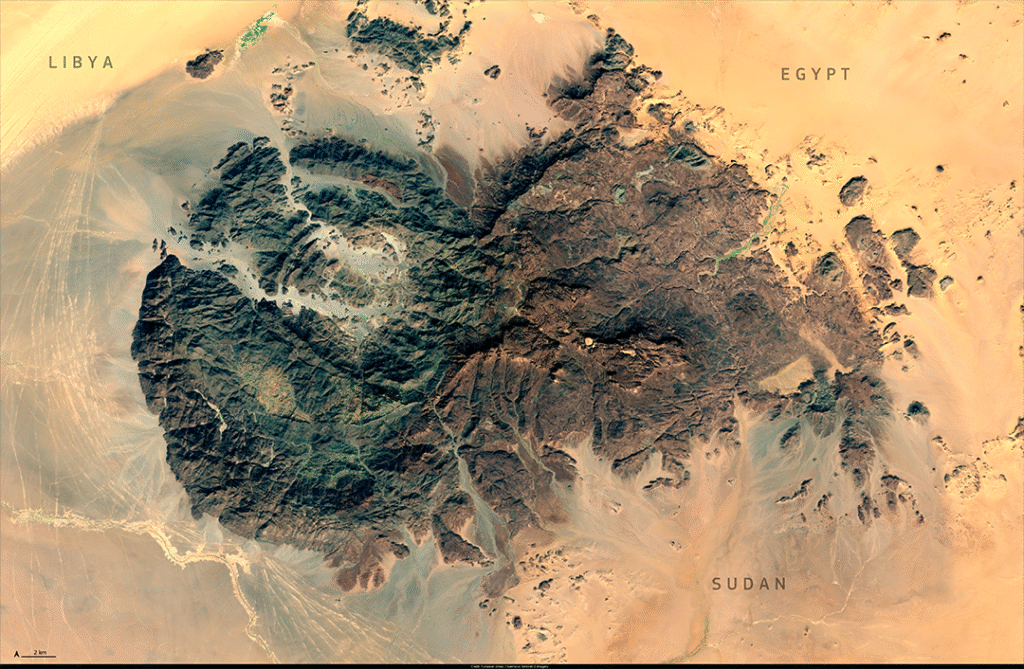Sudan’s paramilitary Rapid Support Forces (RSF) recently took control of the country’s northwestern corner that borders Egypt and Libya. The move could allow greater access to weapons flowing from Libya while raising the potential for Sudan’s war to spread to neighboring countries.
The fighting displaced about 4,000 people, some of whom fled into Egypt for shelter and then were forced to seek refuge in Libya.
The strategic El Uweinat region surrounds Jebel Uweinat, a huge rock formation that has been an important landmark for centuries along the trade route that links Kufra, Libya, and Dongola, Sudan. Studies say that Jebel Uweinat contains the second-largest gold reserve in Africa. The RSF has mined gold from Darfur to finance its fight with the Sudanese Armed Forces (SAF).
By driving out the small number of SAF troops patrolling the lightly populated area, the RSF opened a route to connect with Libyan troops loyal to Field Marshal Khalifa Haftar and his allies with Russia’s mercenary Africa Corps.
The maneuver also gives the RSF the opportunity to attack areas of Northern State and River Nile State that have remained firmly in the SAF’s hands since the war began more than two years ago.
“This latest conquest could mark the start of a RSF push into regions that have so far seen limited fighting, forcing the army to redirect resources to areas from which many senior officers hail,” analyst Shewit Woldemichael wrote recently for the International Crisis Group.
At the outset of Sudan’s conflict in 2023, the RSF received surface-to-air missiles and other weapons through the Egypt-Libya-Sudan Triangle region before the SAF exerted control over that section of Northern State.
After that, according to international investigators, the RSF received supplies smuggled into the Darfur region. However, international pressure on Chad’s government has made it more difficult to smuggle materiel through that route.
SAF attacks on the RSF-held airport in Nyala, South Darfur, also have hindered RSF resupply efforts. One of those attacks destroyed a United Arab Emirates (UAE)-owned cargo plane and killed dozens of RSF fighters and several UAE citizens.
After the SAF’s attack on Nyala, open-source intelligence researcher Rich Tedd posted satellite images on X that showed an increase in air traffic from the UAE in the Kufra region of southeastern Libya, making it crucial for the RSF to control the triangle and its porous border, Woldemichael wrote.
SAF leaders accused Haftar’s forces of invading Sudan in support of the RSF to drive SAF forces out of the northwest triangle. Haftar has denied the accusation.
According to Sudanese authorities, militias allied with the SAF fought a patrol from Haftar’s Subul al-Salam Battalion that entered the country in support of RSF fighters. Some SAF fighters died when Libyan reinforcements arrived from Kufra.
Sudan’s Foreign Ministry called the assault a “dangerous escalation” and accused the UAE of sponsoring the assault. The UAE has provided financial backing to the RSF and to Haftar’s Libyan National Army.
The internationally recognized Libyan government in Tripoli denounced the reported incursion into Sudan and efforts to involve Libya in actions that would further destabilize the region. The government threatened legal action against Libyans who took part in military operations in Sudan.
Egyptian officials, who have allied themselves with the SAF-led government, dismissed the RSF’s takeover of the triangle region as a public relations move meant to distract from their losses in Khartoum and eastern Sudan.
Nevertheless, Maj. Gen. Mohamed Salah Abu Hemila, a member of Egypt’s parliamentary Defense and National Security Committee, said that the situation is being followed with “great attention.”
Woldemichael noted that: “If Haftar-aligned forces continue backing the RSF, supporters of the [Sudanese] Army may be inclined to step up, too.”
Egyptian leaders face a dilemma as the RSF expands operations along their southern border. Egypt supports Haftar in Libya but also is a key SAF ally. Turkey, which backs the Libyan government in Tripoli and the SAF, also might increase its support for the Army, according to Woldemichael.
“With foreign powers getting drawn further into Sudan amid a complex mesh of alliances, the risks that the war’s shock waves will carry across the Red Sea region are heightening,” she wrote.

